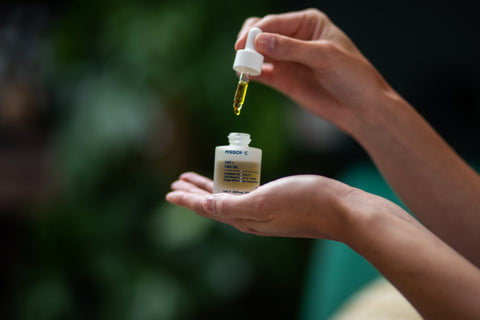
We all know how tough it can be to get through the winter months - particularly those of us who suffer from Seasonal Affective Disorder (SAD) or the ‘winter blues’. The cold, dreary weather and shorter days can have a very real impact on our mental wellbeing, and it’s not uncommon to notice a change in mood during the cold season – especially after the Christmas period. In fact, it is estimated that around 2 million people in the UK suffer from seasonal depression.
But a new topic of research is offering hope in the form of CBD, better known as cannabidiol. In this blog post, we'll discuss why and how emerging evidence suggests that cannabis-based products like CBD might offer some much-needed relief for SAD. We'll also look at what kinds of CBD oil are available to support mental health conditions and discuss steps you can take to discover if this natural remedy could work for you!
What is Seasonal Affective Disorder (SAD)?
Seasonal Affective Disorder (SAD) is a type of depression that occurs at the same time every year. It is often referred to as "winter depression" or “seasonal depression” because it commonly occurs during the winter months when there is less natural sunlight. The symptoms of SAD can include low energy, difficulty concentrating, increased appetite and weight gain, and feelings of hopelessness. SAD can be treated with light therapy, medication, and/or psychotherapy.
While the cause of SAD isn’t fully understood, scientists believe that decreased hours of sunlight in winter can cause a deficiency in serotonin and melatonin in the brain. This can cause sleeplessness, lethargy and depression. SAD symptoms usually improve naturally in the spring and summer in correlation with longer daylight hours. Whilst SAD is a common disorder, support is available and the right treatment can make all the difference in improving your mood and energy levels during the colder months.
What is CBD? Can It Help Symptoms of SAD?
Cannabidiol (CBD) is a compound found in cannabis plants. It doesn't make you high like tetrahydrocannabinol (THC), another compound found in cannabis plants. CBD oil is created by extracting CBD from the buds, stalks and flowers of the cannabis plant and then diluting it with a carrier oil, such as coconut or hemp oil.
Some people are using CBD oil to treat a variety of medical conditions, including winter depression. There is some evidence that CBD oil may help improve symptoms of SAD. A 2018 review of scientific studies found that CBD can help reduce symptoms of depression and stress, for example. An animal study carried out in 2014 also found CBD to have antidepressant effects. Anecdotal reports from regular users of CBD also support the theory that the compound can have positive effects on symptoms of depression, stress and anxiety.
CBD can also improve sleep, which can have a significant impact on mood and energy levels throughout the day.

The effects of CBD on the mind and body stem from its interaction with the body’s endocannabinoid system (ECS); a complex cell-signalling system that helps the body to remain in a state of balance (homeostasis). It is believed that CBD enhances the ECS which results in improved mood, stress levels, pain perception, immune function and more.
More research is needed to determine whether CBD oil is an effective treatment for SAD. However, it's worth considering if you suffer from this condition. CBD oil is safe and relatively affordable, and many users find that it provides relief from symptoms.
How to Use CBD for Seasonal Affective Disorder
CBD is available in a variety of forms including oils, gummies and topicals, but CBD oil is commonly used to treat mental wellbeing issues. CBD oil is usually taken sublingually, where the CBD can enter the bloodstream quickly via the mucous membrane beneath the tongue. You can choose between full-spectrum (contains all the natural hemp compounds), broad-spectrum (contains all the natural compounds except for THC) or pure isolate CBD (pure CBD without additional natural hemp compounds). CBD oil can be used in the morning and/or evening, and throughout the day as required. If you are new to CBD, we advise starting with a low dose and building up gradually. You may feel the effects in the short term, but it can take a few weeks for your body to react to the regular addition of CBD.

If you’d prefer to avoid CBD oil, you might opt for CBD gummies, capsules or vapes.
It’s important to remember that CBD is a supplement, and will therefore be most effective when used in addition to positive lifestyle changes that will boost wellbeing, such as exercise, plenty of sleep and a healthy diet. If you’re using prescription medication, consult your GP before starting CBD. Whilst it has a high safety profile, cannabidiol may interact with certain medications.
Alternative Treatments for SAD
Additional treatments for winter depression include light therapy. This involves the use of UV light to replicate the effects of sunshine on the body. Others opt for Vitamin D supplementation which has been shown to indirectly help improve the mood (Vitamin D is created by the body in response to sun exposure, and low levels have been found in those living with SAD). In addition, experts recommend taking time to practice self-care during the winter months especially. This might include talking therapy, meditation, exercise, journalling, healthy eating and any other methods that prove effective in reducing stress and anxiety.
The Bottom Line
Seasonal Affective Disorder (SAD) is a common and, sometimes, debilitating condition. But with support, symptoms can be managed – no matter the severity. The first step is to consult your GP and consider methods to manage stress; this might be through exercise, meditation or other relaxation techniques. CBD is useful in calming the mind, lifting the mood and achieving better sleep – all of which can also be conducive to reducing the symptoms of SAD.
